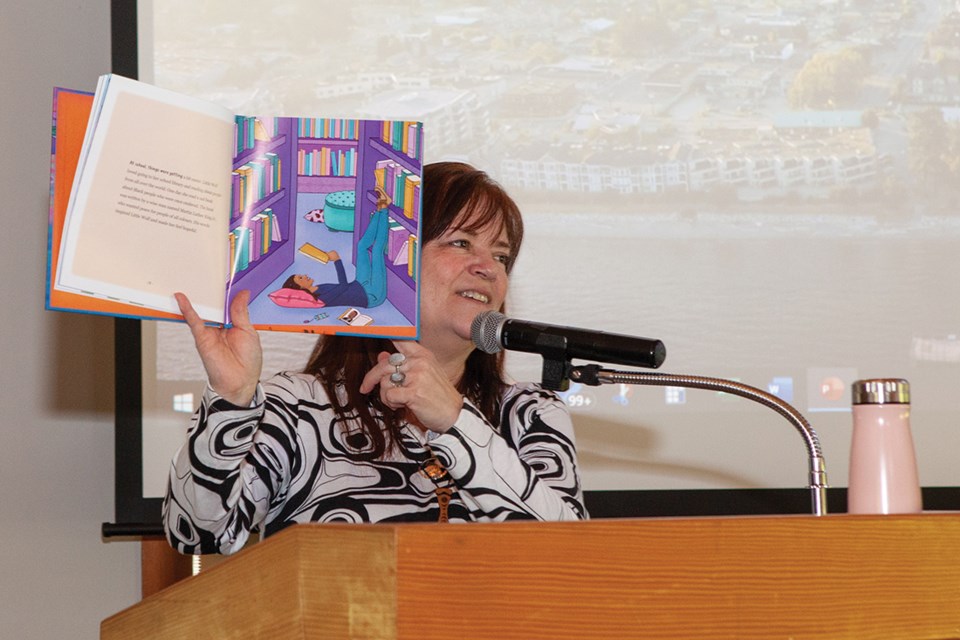The syíyaya Days festival in Sechelt — a 10-day celebration of National Indigenous History Month — shone a spotlight on authors with Sunshine Coast connections whose recent literary output depicts the experience of First Nations and Métis people in Canada.
On June 21, historians and self-described Métis activists Terry and George Goulet presented their latest book on the struggle by the Métis population to attain full recognition as an Indigenous group in Canada.
The Goulets, who live in Sechelt, published Along the Métis Trail: Métis history, heritage, and culture earlier this year. They appeared at Sechelt’s Seaside Centre on June 21 as part of the Métis Cultural Event that included a potluck, fiddle music, and displays of beading.
On the same day, author and broadcaster Teoni Spathelfer offered two readings of her children’s book White Raven, which was inspired by her mother’s experience at St. Michael’s Indian Residential School in Alert Bay. Spathelfer read the book during an event geared for elementary school students.
She returned to the Seaside Centre the next day to share the book with members of the public and older students. Lois Vader, a friend and drummer from the shíshálh Nation, joined Spathelfer to sing the Women’s Warrior Song at the conclusion of the event.
Spathelfer is a member of the Heiltsuk Nation who lived previously on the Sunshine Coast. Her documentary Teoni’s Dream, which also described her mother’s residential school experience, aired nationwide on CBC Radio.
White Raven is one of three books written by Spathelfer that explore contemporary encounters between Indigenous and non-Indigenous cultures in Canada, from a child’s perspective.
In Little Wolf, a young Indigenous girl in an urban environment discovers connections between the land and her heritage. In Abalone Woman, Spathelfer’s latest book, a dream teaches the protagonist about courage and the value of diverse backgrounds. All three books are illustrated by Coast Salish artist Natassia Davies.
“The residential school teachers I write about in White Raven are so different from the teachers we have now,” said Spathelfer. “Many of them were not even trained teachers. At St. Michael’s, there was actually a study sanctioned by the government that limited the nutrition given to students. There was not only a lack of respect for the students as human beings, but a lack of respect for their values.”
Spathelfer’s stories gently allude to the intergenerational trauma resulting from residential schools. “Sometimes school survivors would pass their pain on to others,” she said, “before they could begin their own healing journey.”
For Terry and George Goulet, the journey to full legal recognition of the Métis as an Indigenous group in Canada is ongoing.
“In Along the Métis Trail, we’ve gone past history, heritage and culture, and we address today’s struggle for rights,” said Terry Goulet. “It was important that we get to what’s happening today. There’s still no proper application of the constitution of 1982 in dealing with Métis rights.”
According to George Goulet, Canada’s constitution recognizes the three “rights-bearing” Indigenous peoples of Canada—First Nations, Métis and Inuit—but falls short when it comes to enumerating those rights. “If the Métis don’t get in to represent themselves, they will in effect be ignored,” he says.
The husband and wife team has been researching and publishing about Métis issues since 1990. George’s great-uncle, Elzéar Goulet, was a Louis Riel supporter and leader in the Red River Colony who was murdered by Canadian troops in 1870.
Along the Métis Trail: Métis history, heritage, and culture and White Raven are available for purchase at Talewinds Books, the Tsain-Ko Gift Shop, and the EarthFair Store in Pender Harbour.



